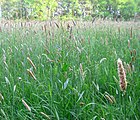Note: This is a project under development. The articles on this wiki are just being initiated and broadly incomplete. You can Help creating new pages.
Difference between revisions of "Hierochloe odorata - Sweet grass"
(→Identification) |
(→References) |
||
| Line 83: | Line 83: | ||
<references> | <references> | ||
| − | <ref name="chemical composition">[https://www.sigmaaldrich.com/life-science/nutrition-research/learning-center/plant-profiler/acorus-calamus.html | + | <ref name="chemical composition">[https://www.sigmaaldrich.com/life-science/nutrition-research/learning-center/plant-profiler/acorus-calamus.html Constituents]</ref> |
| − | <ref name="Leaf">[https://www.onlyfoods.net/sweet-grass.html | + | <ref name="Leaf">[https://www.onlyfoods.net/sweet-grass.html Grass description]</ref> |
Latest revision as of 11:05, 18 May 2020
Sweet grass or Hierochloe odorata is an aromatic herb native to northern Eurasia and North America. It is used in herbal medicine and in the production of distilled beverages.
Contents
[hide]- 1 Uses
- 2 Parts Used
- 3 Chemical Composition
- 4 Common names
- 5 Properties
- 6 Habit
- 7 Identification
- 8 List of Ayurvedic medicine in which the herb is used
- 9 Where to get the saplings
- 10 Mode of Propagation
- 11 How to plant/cultivate
- 12 Commonly seen growing in areas
- 13 Photo Gallery
- 14 References
- 15 External Links
Uses
Cough, Cuts, Venereal diseases, Eyewash, Vaginal bleeding, Placenta, Lymphodema, Diarrhea, Sore throats
Parts Used
Chemical Composition
Calamus (as various extracts of the rhizome) contains constituents such as alkaloids, flavonoids, gums, lectins, mucilage, phenols, quinone, saponins, sugars, tannins, and triterpenes[1]
Common names
| Language | Common name |
|---|---|
| Kannada | |
| Hindi | |
| Malayalam | |
| Tamil | |
| Telugu | |
| Marathi | NA |
| Gujarathi | NA |
| Punjabi | NA |
| Kashmiri | NA |
| Sanskrit | |
| English | Sweet grass |
Properties
Reference: Dravya - Substance, Rasa - Taste, Guna - Qualities, Veerya - Potency, Vipaka - Post-digesion effect, Karma - Pharmacological activity, Prabhava - Therepeutics.
Dravya
Rasa
Guna
Veerya
Vipaka
Karma
Prabhava
Habit
Identification
Leaf
| Kind | Shape | Feature |
|---|---|---|
| Simple | Flat | They reach a length of around 10 cm to 30 cm |
Flower
| Type | Size | Color and composition | Stamen | More information |
|---|---|---|---|---|
| Unisexual | 2-4mm long | White | 5 | Flowers Season is June - August |
Fruit
| Type | Size | Mass | Appearance | Seeds | More information |
|---|---|---|---|---|---|
| Simple | 7–10mm | The fruits are classified as caryopsis | The fruits are classified as caryopsis | - | {{{6}}} |
Other features
List of Ayurvedic medicine in which the herb is used
Where to get the saplings
Mode of Propagation
How to plant/cultivate
Commonly seen growing in areas
Moist soil, Growing in nutrition rich soil, Northern areas of Europe.
Photo Gallery
References
External Links
- Ayurvedic Herbs known to be helpful to treat Cough
- Ayurvedic Herbs known to be helpful to treat Cuts
- Ayurvedic Herbs known to be helpful to treat Venereal diseases
- Ayurvedic Herbs known to be helpful to treat Eyewash
- Ayurvedic Herbs known to be helpful to treat Vaginal bleeding
- Ayurvedic Herbs known to be helpful to treat Placenta
- Ayurvedic Herbs known to be helpful to treat Lymphodema
- Ayurvedic Herbs known to be helpful to treat Diarrhea
- Ayurvedic Herbs known to be helpful to treat Sore throats
- Herbs with Leaves used in medicine
- Herbs with common name in English
- Habit - Herb
- Index of Plants which can be propagated by Seeds
- Herbs that are commonly seen in the region of Moist soil
- Herbs that are commonly seen in the region of Growing in nutrition rich soil
- Herbs that are commonly seen in the region of Northern areas of Europe
- Herbs
- Poaceae






